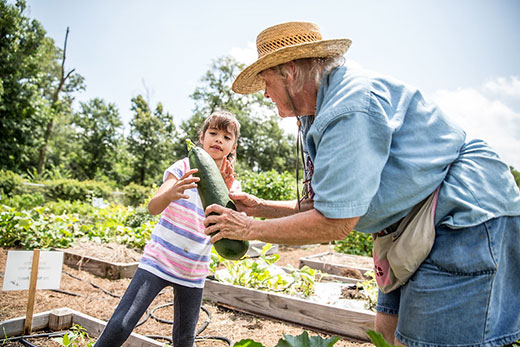
Gardening is a fun activity that people of all ages can enjoy. | Download this photo.
K-State experts say gardening can be mood booster
Studies indicate gardening helps improve mental, physical and social wellbeing
June 8, 2020
MANHATTAN, Kan. – As an academic, Cheryl Boyer is familiar with the growing body of research that suggests gardening is a boost to the body and mind.
But as a gardener herself, it’s just plain fun.
“Taking on a gardening project,” said Boyer, K-State Research and Extension state leader for horticulture and natural resources, “gives people the opportunity to get outside, work with their hands, and get away from the computer, social media and the news … maybe listen to some music and get out of their heads for a while.”
It’s perhaps too early to know for sure, but the global pandemic seems to have led to an increased interest in gardening across the country.
In Kansas, Boyer and several of her colleagues statewide recently launched an online series called the K-State Garden Hour, which airs each Wednesday from noon to 1 p.m.
In its first week, the program had more than 400 participants tune in to a talk on planting native flowers in the backyard. Then, in just the second week, nearly 1,000 people registered for a lesson on growing tomatoes.
Boyer said that program was set up to accommodate 500 participants, so the early success has led organizers to re-evaluate for an online session that can host as many as 1,000 people in the future.
“The feedback we have received has been very positive,” Boyer said. “I think people stuck at home right now are finding a lot of value in the educational information we offer through K-State Research and Extension, particularly as it helps them be more successful in the garden and understand our natural world better. It’s been very rewarding to help people find our excellent resources.
“You know, I think people who garden discover the universal joys of working with their hands and seeing the results of their work grow and thrive.”
In the last 10 years, research has supported Americans’ interest in gardening, and the health benefits that come from it.
Beginning in 2011, Texas A&M researchers Charlie Hall and Madeline Dickson published three reviews in the Journal of Environmental Horticulture to outline the benefits associated with gardening.
They reported such physiological health benefits as better sleep; lower incidence of diabetes, cardiovascular disease, obesity and allergies; enhanced immunity; increased physical activity; and positive cognitive development.
In a subsequent review, they reported such social benefits as increased attachment to place and community; reduced community crime; improved access to healthy and affordable food; and improved school performance in children.
Related to mental health, Boyer noted other researchers’ studies in which home gardeners “describe a sense of vitality obtained from being outdoors in natural settings, which gives energy to purposeful action by adults.”
“Combined with better sleep and all the other benefits listed, gardening is a natural stress management technique that contributes to mood boosting,” she said.
Boyer noted that gardening is for anyone, experienced or not. In Kansas, the Extension Master Gardeners volunteer program is a good in-road to learning, she said.
“I think Extension Master Gardeners is the best example of a program that directly addresses the combination of promoting gardening and mental health benefits,” she said. “Most participants in the program join for the education and social interaction, then later experience all of the other benefits as they grow in their horticultural efforts.”
Having a support group also can help beginning gardeners overcome their fear of early failure, she noted.
“For beginners, find something that speaks to your heart and soul, and put your effort where you can enjoy it on a regular basis,” Boyer said. “For example, we are seeing a resurgence in interest toward house plants, especially with younger folks. There are so many cool plants to try; so, just go for it. If it dies, no biggie. Use your friendly K-State Research and Extension agent to figure out what went wrong and try again.
“There can be a lot to know about plants, but you don’t need to know everything at once. Gardening is an interest that you can enjoy on a surface level as well as a lifelong pursuit of deeper knowledge.”

